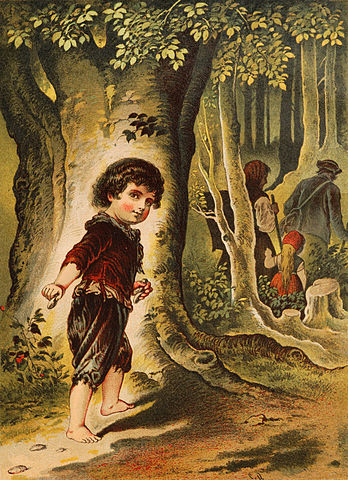
How divine guidance is understood shapes both the devoted and nominal Christian’s life. Choosing a mate, a career, a home, or even a parking space are often determined by how one understands God’s leading and purposes. One way to understand divine guidance is to use the metaphor of a blueprint, which I elaborated on in a previous post. Blueprint guidance is an inadequate model for divine guidance primarily because it sells short the image of God in humans and conceives of us more as puppets than partners.
Another useful metaphor comes from the Brothers Grimm fairy tale, Hansel and Gretel. Journeying into the woods to be abandoned by their family, the children leave a trail of breadcrumbs along their path in order to find their way home. This method of “breadcrumb guidance” ultimately fails them. Breadcrumb guidance is a somewhat better way to understand God’s leading in our lives, yet it distorts God’s purpose for us, leaving us passive or even worse, self-indulgent.
A Goal, Not a Plan
This model of guidance portrays God’s will for us as a goal, rather than an exact plan. He has a unique objective in mind for each of us, perhaps differing according to each stage in our life, but nonetheless a particular outcome is desired by Him. Our task is to seek Him, day by day, turn by turn, in order to reach that outcome. He allows for the vicissitudes of life, our human weaknesses, and even our sin, so a wrong turn here or there isn’t a show stopper. He will provide new breadcrumbs to lead us to the right path. As long as we’re looking for the breadcrumbs of His leading, then everything will turn out well in the end. This idea is supposed to be an exciting adventure in the daily discovery of God’s will.
The problem with using breadcrumbs, as we learn from the Hansel and Gretel tale, is that they are not stable markers. Mental impressions, signs, gut feelings, and “words” obtained through scripture roulette are easily devoured by the jaws of hard reality, just as the breadcrumbs were gobbled up by the birds. A living and dynamic communication with God is of course desirable, but looking for a stream of divine nods to choose our steps can become a highly subjective, introspective, and even arbitrary way of managing our life. It can border on the crazy or become a justification to do whatever we want.
Led by Principle Rather than Impulse
Besides this, breadcrumb guidance fundamentally violates the purpose that God has for us, namely, to be ruled by principle rather than impulse. In the scriptures, maturity means to gain discernment and wisdom. We’re to learn the ways of God, in order to be like Him, rather than aspire to be good detectives with large magnifying glasses. David exhorts us to not be like the horse and mule who need a bit and bridle to hold them in check, but to gain understanding (Psalm 32:9). Indeed, God wants to speak to us, but not think for us. Ephesians 4 outlines God’s discipleship goals for His people which is to know and practice the truth, the essence of love.
When God created Adam and Eve His hope was to invite them into the communion of the Trinity. As reasoning, creative beings themselves, humankind would be able to relate to God in a way that actually mattered. The image of God imprinted on their souls qualified them to be true companions, although not equals. Yet, as real persons, the joys and sorrows would be genuine for them and God, which would be impossible for mere puppets. Both Geppetto and Pinocchio knew a woodcarving with strings couldn’t compete with a real boy.
In my final post on this subject, I’ll describe a model for divine guidance that I believe more closely follows the biblical message. I call it apprentice guidance. The master trains his apprentice to become more than a servant who simply executes commands and blends into the background. One day he hopes to call the apprentice a co-laborer and friend. I seem to remember Jesus saying something just like that.